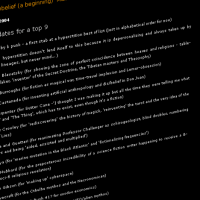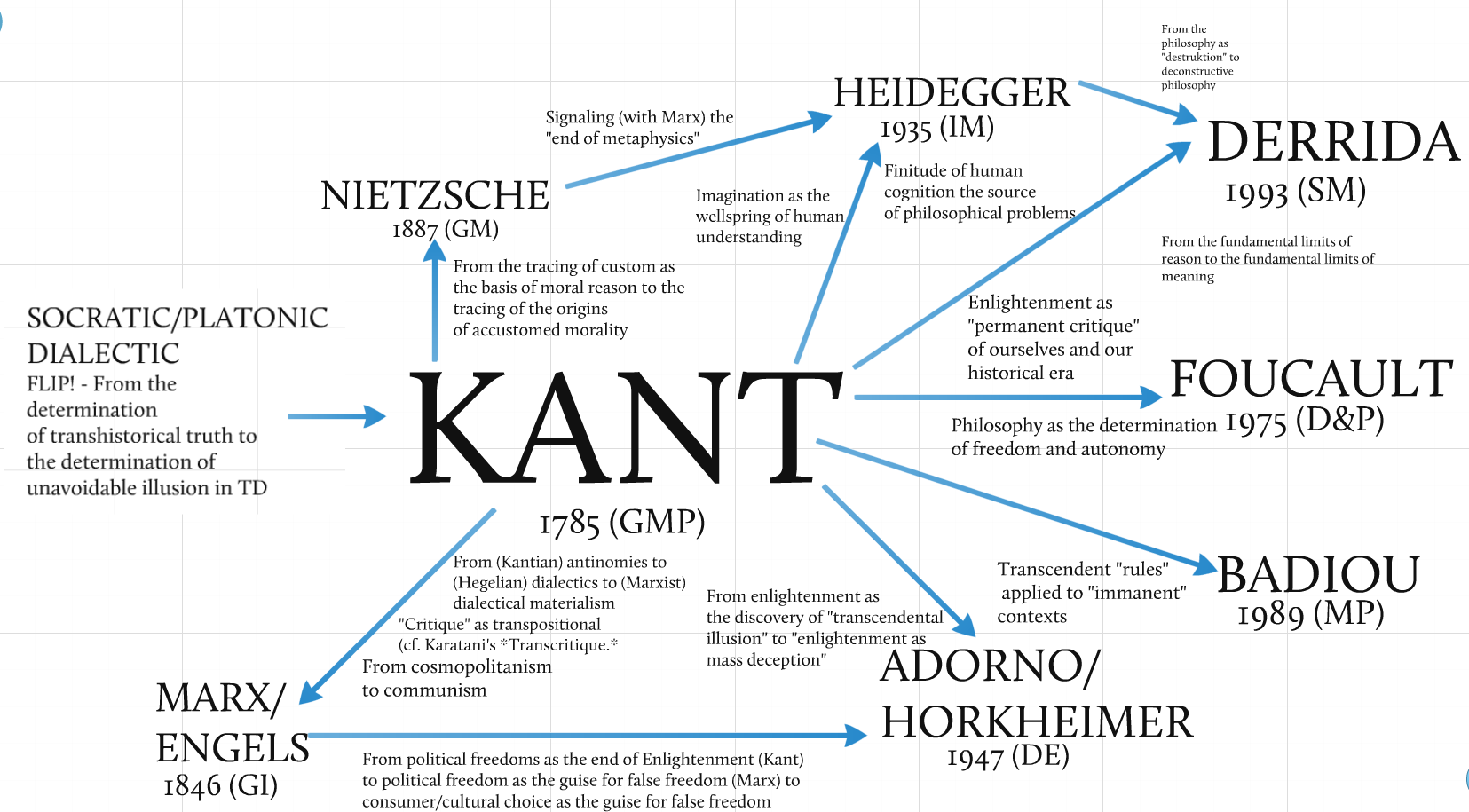
These persisting deadlocks and oscillations bear witness to the fact that Hegel does not fit the key metaphysical narrative shared by thinkers as different as Nietzsche, Heidegger, and Derrida, who all conceive their own age as that of the critical turning point of metaphysics: in their (our) time, metaphysics has exhausted its potential, and the thinker’s duty is to prepare the ground for a new, post-metaphysical thinking. More generally, the entire Judeo-Christian history, up to postmodernity, is determined by what one is tempted to call the “Hölderlin paradigm”: “Where the danger is, grows also what can save us” (“Wo aber Gefahr ist weachst das Rettende auch”). The present moment appears as the lowest point in a long process of historical decadence (the flight of Gods, alienation…), but the danger of the catastrophic loss of the essential dimension of being-human also opens up the possibility of a reversal (Kehre)—proletarian revolution, the arrival of new gods (which, according to the late Heidegger, alone can save us), etc. Are we able to imagine a “pagan” non-historical universe, a universe thoroughly outside this paradigm, a universe in which (historical) time just flows, with no teleological curvature, in which the idea of a dangerous moment of decision (Benjamin’s Jetzt-Zeit) out of which a “bright future” will emerge, a future that will redeem the past itself, or is this simply meaningless?
Although this paradigm is usually identified with Christianity, the latter, at its most radical, nonetheless seems to give it a unique twist: everything that has to happen has already happened, there is nothing to wait for, we do not have to wait for the Event, the arrival of Messiah, the Messiah has already arrived, the Event has already taken place, and we live in its aftermath. And Hegel? This basic attitude of historical closure is also the message of Hegel, of his dictum that the owl of Minerva takes off in the twilight—but the crucial point, however difficult to grasp, is that this stance, far from condemning us to passive reflection, opens up the space for active intervention.
What this means is that Hegel is not part of the “Hölderlin-paradigm,” even if he is usually considered its main representative. A certain historical teleology is wrongly associated with Hegel: there is a naive beginning, an immediacy that lacks inner wealth and articulation; development then means dispersion, a fall, right up to the total alienation that opens up the possibility of reversal. Marx deployed this type of teleological scheme of history in his famous manuscript on “Pre-capitalist modes of economic production” according to which the uniqueness of the capitalist mode of production lies in the fact that, in it, “labor is torn out from its primordial immersion in its objective conditions, and, because of this, it appears on the one side itself as labor, and, on the other side, as the labor’s own product, as objectified labor, obtains against labor a completely autonomous existence as value.”[27] The worker thus appears as the “objectless, purely subjective capacity of labor, confronted with the objective conditions of production as its non-property, as a foreign property, as value which exists for itself, as capital.” However, this extreme form of alienation, in which, in the guise of the relationship of the capital towards wage labor, labor, productive activity, appears as opposed to its own conditions and to its own product, is a necessary point of transition—and, for that reason, in itself, in an inverted form, posited on its head, it already contains the disintegration of all limited presuppositions of production, and even creates and produces the unconditional presuppositions of production, and thereby all material conditions for the total, universal development of the productive forces of the individuals.[28]
History is thus the gradual process of the separation of subjective activity from its objective conditions, that is, from its immersion in the substantial totality. This process reaches its culmination in modern capitalism with the emergence of the proletariat, the substance-less subjectivity of workers totally separated from their objective conditions. This separation, however, is in itself already their liberation, since it creates pure subjectivity, exempted from all substantial ties, which has only to appropriate its objective conditions. In this sense, Marx remains within the “Hölderlin-paradigm”: where there is danger (utter alienation), the redemptive force also grows. Marx’s notion of historical process therefore remains fundamentally a teleological one: all history hitherto points towards the present moment, we live in kairos, the time of shift, and are able to discern in the miserable present the possibility of an act to come.
But, again, is this process (that unfolds from substantial unity through subjective alienation to the reunification of subject with substance, in which substance is thoroughly subjectivized, reappropriated by the subject) really a Hegelian one? The first thing to note is that the kairos position of finding oneself on the brink of the reversal of Danger into Redemption, of attending (or acting as an agent of) the telos of history, is not a position ever adopted by Hegel. The conclusive moment of the dialectical process is not a synthetic unity, a dis-alienation conceived as a return to the (subjective or substantial) One. For Hegel, alienation is constitutive of the subject, in the radical sense that the subject does not pre-exist its alienation, but emerges through it: the subject emerges through its own loss. Consequently, the Hegelian “reconciliation” is not an overcoming of alienation, but a reconciliation with alienation itself. So when Hegel says that, in dis-alienation, the subject “recognizes itself in its Other,” the radical ambiguity of this statement should be kept in mind: it is not only that the subject recognizes in its Other the alienated result of its own activity, it is also (and primarily) that the subject recognizes the decentered Other as its own site, i.e., that it recognizes its own decentered character.
More precisely, alienation can be “overcome”—if, by alienation, we mean the subject’s self-experience as a subordinated moment of some substantial big Other that runs the show (History, Destiny, God, Nature …). Alienation is “overcome” when the subject experiences that “there is no big Other” (Lacan), that its status is that of a semblance, its character inconsistent and antagonistic. This, however, does not mean that the subject reappropriates the big Other: rather, the subject’s lack with regard to the Other is transposed into the big Other itself. Such a redoubling of the lack, this overlapping of my lack with the lack in the Other itself, does not cancel the lack—on the contrary, what the subject experiences is that the lack/gap in the (substantial) Other is the condition of possibility, the site, of the subject itself.
What this implies is that there is a gap prior to alienation: alienation does not introduce a gap or loss into a pre-existing organic unity, on the contrary, it covers up the gap in the Other. In alienation, the subject experiences the Other as the full agent running the show, as the one who “has it” (what the subject is lacking), i.e., the illusion of alienation is the same as the illusion of transference—that the Other knows. (Dis-alienation is thus basically the same move as the fall of the subject-supposed-to-know at the end of the analytic process.) What we then have is a dialectical process with a structure wholly different from the triad of substantial immediacy/alienation/reconciliation in a new higher unity: there is no original unity preceding loss, what is lost is retroactively constituted through its loss, and the properly dialectical reconciliation resides in fully assuming the consequences of this retroactivity. Let us go back to the previously cited example of India, and the complaint of the cultural theorists that being compelled to use the English language is a form of cultural colonialism, censoring their true identity. In this case, “reconciliation” means a reconciliation with the English language, which is to be accepted not as an obstacle to a new India which should be discarded in favor of some local language, but as an enabling medium, indeed, as a positive condition of liberation. The true victory over colonization lies not in the return to some authentic pre-colonial substance, even less in a “synthesis” of modern civilization and pre-modern origins, but, paradoxically, in the fully accomplished loss of these pre-modern origins. In other words, colonialism is not overcome when the intrusion of English as a medium is abolished, but when the colonizers are as it were beaten at their own game—when the new Indian identity is effortlessly formulated in English, when the English language is “denaturalized,” losing its privileged link to its “native” Anglo-Saxon speakers.
If we discard the obscene notion that it is better to be “authentically” tortured by one’s “own” language than by an imposed foreign one, then we should first emphasize the liberating aspect of being compelled to use a foreign “universal” language. There was a certain historical wisdom contained in the fact that, from medieval times until fairly recently, the lingua franca of the West was Latin, a “secondary” inauthentic language, a “fall” from Greek with all its authentic burden. It was this very emptiness and “inauthenticity” of Latin that allowed Europeans to fill it in with their own particular contents, in contrast to the stuffy overbearing nature of Greek. Beckett learned this same lesson when he started to write in French, a foreign language, leaving behind the “authenticity” of his roots. In short, the function of treating a foreign language as an oppressive imposition is to obfuscate the oppressive dimensions of our own language, to retroactively elevate our own maternal tongue into a lost paradise of full authentic expression. The move to be accomplished when we experience an imposed foreign language as oppressive, as out of sync with our innermost life, is thus to transpose this discord into our own maternal tongue.[29]
Exactly the same holds for the Fall in Christianity: the way out of the Fall into sin lies not in a return to God, but in the full consummation of the Fall, the death of God. This is how we should read Christ’s last words: “It is accomplished”—with the death of God (of Beyond), the reconciliation is accomplished … This is why Lacan rejects the standard Christian idea that Jesus saved us by taking our sins upon himself and paying the price for them with his sacrifice: “It is true that the historical tale of Christ does not present itself as the project to save mankind, but to save God. One has to acknowledge that he who took on this project, Christ, that he has paid the price for it, that is the least one can say.”[30] To save God in what sense? By way of assuming guilt for the Fall, the lack in the Other is obfuscated: God is pure; had we not Fallen, we would be able to dwell in the Paradise of full, non-castrated jouissance.[31] This, however, is precisely not what happens in Christ’s death: his sacrifice does not obfuscate the Other’s (God-the-Father’s) lack—on the contrary, it displays this lack, the inexistence of the big Other. It was already Hegel who noted that what dies on the cross is the God of Beyond himself: instead of us sacrificing ourselves to (or for) Him, God sacrifices Himself and dies—the message of this paradox can only be that there is no one to sacrifice to (or for). In other words, as René Girard once said, the sacrifice of Christ is the act destined to end the very logic of sacrifice. Christ takes the sins of the world upon himself—literally: they are not ours, the lack is in God Himself.
Notes
27. Karl Marx and Friedrich Engels, Gesamtausgabe, Abteilung II, Band 1, Berlin: Dietz Verlag 1976, p. 431.
28. Ibid., p. 432.
29. But there is also the opposite experience of our own language as provincial, primitive, marked by private passions and obscenities which only obscure clear reasoning and expression, an experience which pushes us towards using a universal second language in order to think clearly and freely. Is this not how a national language emerges and comes to replace the multiplicity of dialects?
30. Jacques Lacan, Le séminaire, livre XX: Encore, Paris: Seuil 1975, p. 98.
31. This same logic was at work in Stalinist show trials: by confessing their guilt, by assuming responsibility for the problems and failures of the Soviet system, the accused did a great service to the Party, maintaining its purity—the troubles of daily life were not the Party’s responsibility … Likewise, the same effort to rescue the Other sustains the neurotic’s feelings of guilt: the neurotic blames himself, he takes the failure upon himself in order to maintain the fantasy of an ideal father.






















































